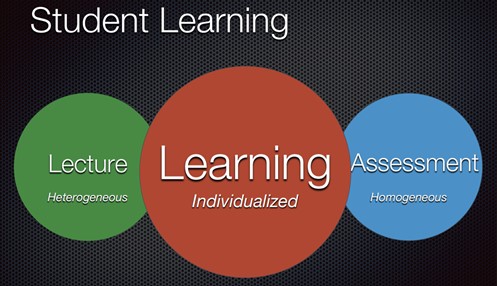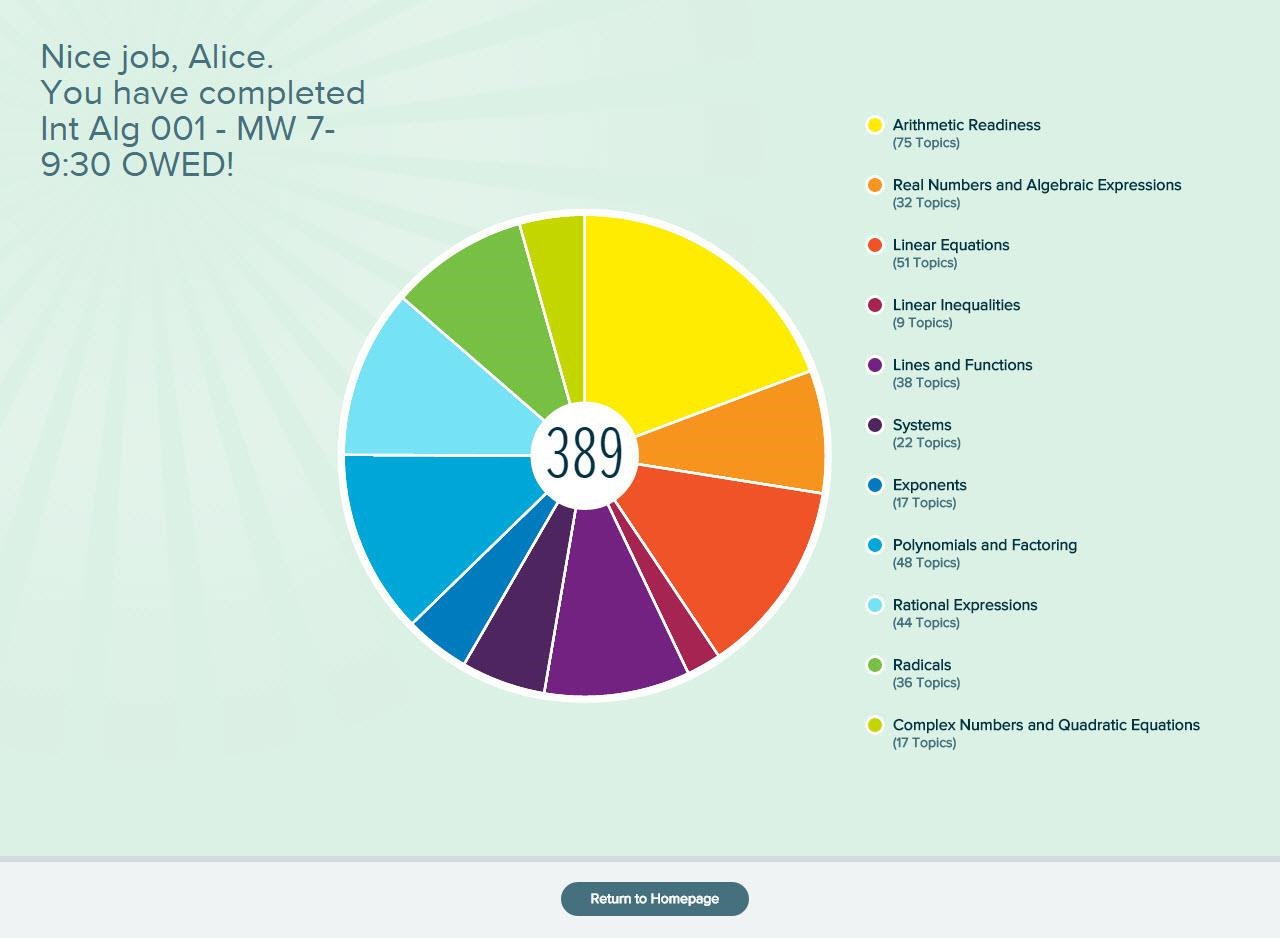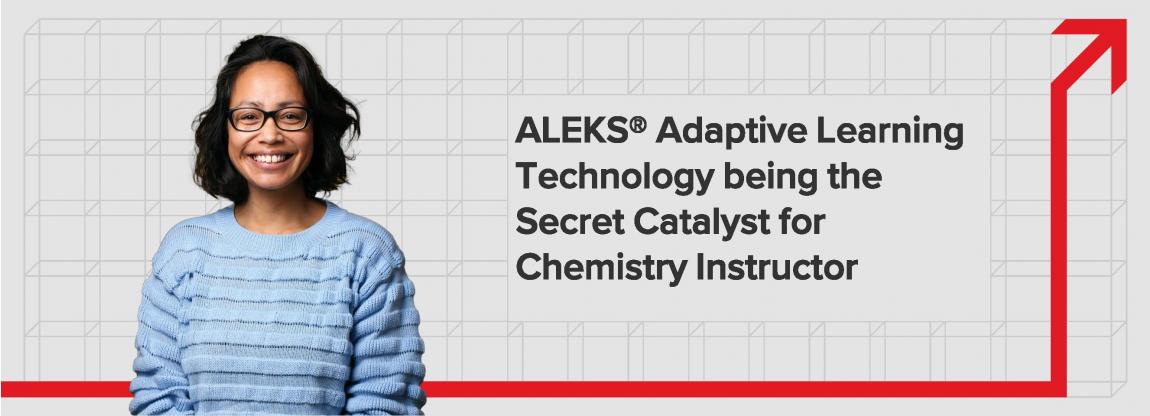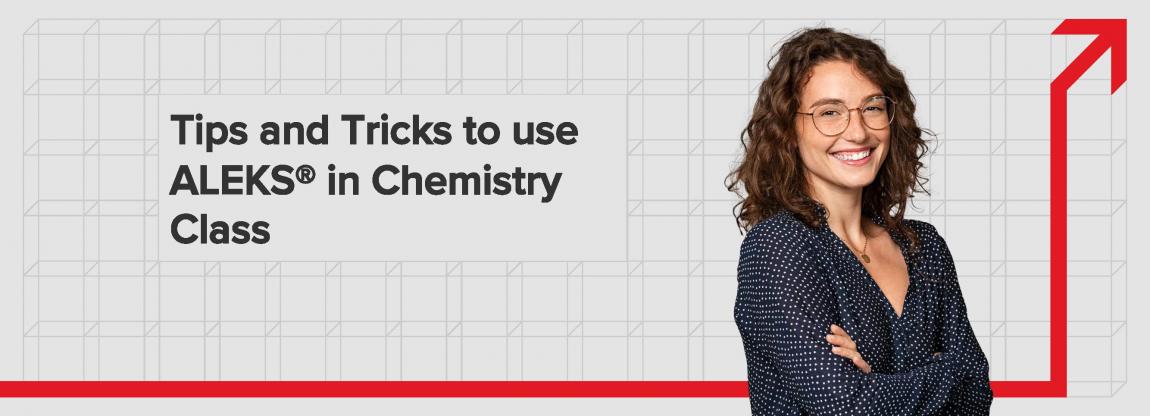ALEKS® Adaptive Learning Technology being the Secret Catalyst for Chemistry Instructor
Irrespective of the course an instructor teaches, it encompasses three key areas – Lecture, Assessment, and Learning. And this has been illustrated through a Venn diagram below.


Usually, the lecture is delivered to a heterogeneous group of students coming from all walks of life whereas the assessment is conducted at a homogenous level where all students get a similar set of questions and are assessed based on the same parameters. But the good part is that the instructors have control over this disparity which can be tactfully managed by them. But the one thing that the instructors do not have control over is the learning - it’s an individualised experience of each student. Therefore, the biggest challenge for instructors is deciding how best to get their students to learn.
The instructors play a vital role in teaching, and they are the subject matter experts. But many times, instructors have shown interest in using some tool that can supplement their teaching material and facilitate a good learning experience for the students. And this is where ALEKS®, a digital learning and assessment platform, comes into the picture. It can not only address a major challenge of the instructors by providing a personalised learning experience to the students but also help them create "A classroom of one".
Can ALEKS be a boon for Chemistry instructors?
Some instructors are hesitant in using digital technology in their teaching or worse, some fear that it will replace them. Whilst that may concern some, Jason Overby (Chemistry instructor from College of Charleston) feels that it’s not true. And this can be better understood with an analogy. MRI (Magnetic Resonance Imaging) has proved to be a significant tool for doctors and nurses in the medical field and provided them access to the data that they could not have got otherwise, making their jobs easier. And ALEKS replicates that experience for the Chemistry (and Maths) instructors in the education sector. It enhances the teaching mechanism of the instructors whilst providing a better experience to the students, without diminishing their role in the learning process.
ALEKS can provide comprehensive data to the instructors on the knowledge state of each student at the beginning of the course, which is invaluable as it will facilitate in understanding the past learnings of their students. ALEKS figures out the topics that a student has already mastered, not mastered and the areas that the student is ready to learn. Whereas for the instructors, it’s a very time-consuming process to conduct that in-depth research and analysis with each of his students and that’s one of the many ways how ALEKS can alleviate pressure off the instructors’ shoulders.
How does ALEKS work?
ALEKS uses artificial intelligence (AI) to map each student’s knowledge state and tailors the learning path to that student. It uses the method of interferences to help understand what a student knows and does not know, i.e. if a student shows prior knowledge of a topic, all linked topics beforehand are assumed to be understood. For example, if a student has to successfully reach state F, then he should have the knowledge of all the prior states i.e. A to E.
A ----> B ----> C ----> D ----> E ----> F
An important feature about ALEKS is that it will recognise and give credit to the student for knowing states A, B and D and at the same time identify that the student needs to work more on C and E before reaching the result F.
Everything happens in a very methodological manner. ALEKS continually updates students’ knowledge state and is ready to learn possibilities by constantly recording his successes and failures. And this information is then used to guide him along with one of the optimal learning paths. And because of this constant evaluation, ALEKS doesn’t bore students with the same topics that they already know, instead, it focuses on the topics that they are ready to learn and that’s where the key learning lies.
ALEKS not only keeps the students engaged and motivated on their learning paths but also results in tremendous learning momentum without causing any frustration or boredom.
How can instructors use ALEKS?
It is important to understand its functionalities so that it can be effectively used by the instructors.
First and foremost, students engage with an “Initial Knowledge Check”, an important functionality that’s available in ALEKS. This assessment defines the knowledge state of each and every student. This gives a good understanding of what the student has already mastered, not mastered and the areas that the student is ready to learn. The instructor can then see the results in a multi-coloured pie chart. The chart doesn’t reflect any grades, it simply represents the student’s knowledge state about the various topics set by the instructor. This helps all the students understand what topics they need to focus on and consequently keeps them on their toes. And the best part is that the instructor gets to choose those topics depending on the course he will be teaching to the students.
After knowing the initial knowledge state of the student, it lets the student continue his own path. ALEKS then categorise the topics into three categories – Ready to learn, learned and mastered. Mastered is the next level above learned where the student has a firm grasp on the material and this can be verified by the instructor by looking at the data in ALEKS.


ALEKS Pie
ALEKS is an adaptive learning system that is not about individual questions but ensuring that the student does a very thorough assessment on the topics assigned by the instructor. It does an amazing job in helping students to inculcate knowledge retention as well as advancing their learning.
For an instructor, it is important to understand how this happens. So, if a student attempts to answer a particular question and if it goes wrong, ALEKS prompts him to try again and also gives an option to look at a very detailed explanation – that’s where the learning happens! And this explanation can be further integrated with McGraw Hill’s textbooks. This is called ALEKSpedia which shows a thorough explanation of the material. The iterative pattern of ‘assess and learn’ helps the student practice the topics that he has already learned.
Summary
- ALEKS is a comprehensive learning solution for students and instructors alike
- Adaptive learning assignments and online homework can be assigned from ALEKS
- A reimagined interactive format of the eBook is available for Overby/Chang 14th Edition.
- Virtual Labs is also available within ALEKS
ALEKS empowers instructors with the flexibility and control to create an environment that helps students achieve their unique goals. Chemistry (and Maths) is considered intimidating subjects and some students feel the need for encouragement. With the help of ALEKS, students can practice more, follow their progress and most importantly, see their knowledge grow. ALEKS also enables students to celebrate when they accomplish their learning goals.
ALEKS can be used in a variety of different course formats, from a traditional classroom structure where the instructor teaches a big class, to that of a lab format where students are working at their own pace, to an online format where it guides the students through the course material just like a core teacher. Students around the world are now able to unlock their potential with the help of ALEKS.
The content of this blog has been extracted from the webinar conducted by Jason Overby, where he shared his teaching experience with ALEKS and how he keeps his students engaged while they gain mastery in Chemistry. You can watch the webinar here.
About the Author Jason Overby
“I have never used anything like ALEKS. There truly is nothing like it in the market. You have a lot of tools to choose from, just within this one platform. The power of ALEKS comes from tried-and-true cognitive psychology. The data coming out over the last decade with the success in Chemistry with ALEKS is unsurpassed. You can find a number of research papers in the Journal of Chemical Education talking about the efficacy of ALEKS. As a user, I won’t use anything else. I have 10-12 years of experience of virtually using every online platform out there, nothing is even remotely close.”
It already is an extremely powerful tool and is only getting more powerful.” – Jason Overby
Jason Overby is a professor at the College of Charleston. He has received his B.S. in Chemistry and Political Science from the University of Tennessee at Martin, his PhD in inorganic chemistry from Vanderbilt University, and has conducted postdoctoral research at Dartmouth College. Since joining the Department of Chemistry and Biochemistry at the College of Charleston, Jason has taught courses from general Chemistry to advanced organic Chemistry and conducted research with undergraduates. He has an interest in integrating technology into the classroom, with a particular focus on adaptive learning. He is the lead author of Chemistry, 14th edition and co-author of Chemistry, 13th edition.


